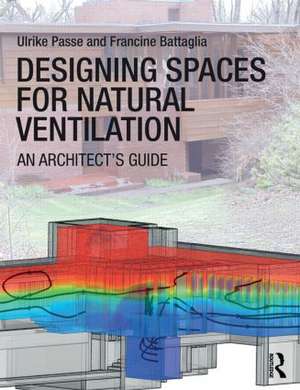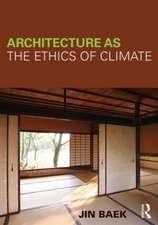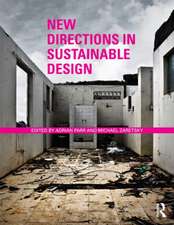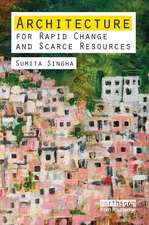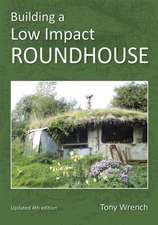Designing Spaces for Natural Ventilation: An Architect's Guide
Autor Ulrike Passe, Francine Battagliaen Limba Engleză Paperback – 30 apr 2015
| Toate formatele și edițiile | Preț | Express |
|---|---|---|
| Paperback (1) | 495.98 lei 6-8 săpt. | |
| Taylor & Francis – 30 apr 2015 | 495.98 lei 6-8 săpt. | |
| Hardback (1) | 1000.37 lei 6-8 săpt. | |
| Taylor & Francis – mai 2015 | 1000.37 lei 6-8 săpt. |
Preț: 495.98 lei
Preț vechi: 656.52 lei
-24% Nou
Puncte Express: 744
Preț estimativ în valută:
94.90€ • 99.09$ • 78.55£
94.90€ • 99.09$ • 78.55£
Carte tipărită la comandă
Livrare economică 05-19 aprilie
Preluare comenzi: 021 569.72.76
Specificații
ISBN-13: 9780415817776
ISBN-10: 0415817773
Pagini: 374
Ilustrații: NO
Dimensiuni: 189 x 246 x 23 mm
Greutate: 1.02 kg
Ediția:1
Editura: Taylor & Francis
Colecția Routledge
Locul publicării:Oxford, United Kingdom
ISBN-10: 0415817773
Pagini: 374
Ilustrații: NO
Dimensiuni: 189 x 246 x 23 mm
Greutate: 1.02 kg
Ediția:1
Editura: Taylor & Francis
Colecția Routledge
Locul publicării:Oxford, United Kingdom
Public țintă
Professional, Professional Practice & Development, and UndergraduateCuprins
Foreword by Sue Roaf. Acknowledgements. Introduction. Part 1: Theories and Scientific Background 1. The Importance of Space for Natural Ventilation 2. The Physics of Air Flow 3. The Importance of Fresh Air for Occupant's Health 4. Natural Ventilation and Climate 5. Inherited Spatial Archetypes for Natural Ventilation 6. Natural Ventilation and Thermal Comfort Part 2: Parameters 7. Pressure as Indicator 8. Spatial Strategies / Space-Induced Air Movement 9. Façade as Filter: From Windows to Curtain Walls to Adaptive and Smart Skins 10. Control of Natural Ventilation Part 3: Making Air Visible: Complex Science Summarized for Architects and Designers 11. Overview of Methods for Calculation and Simulation 12. Computational Fluid Dynamics Conclusion. Notes. Bibliography. Image Credits. Index
Notă biografică
Ulrike Passe is an Associate Professor of Architecture and the Director of the Center for Building Energy Research (CBER) at Iowa State University, USA.
Francine Battaglia is Professor of Mechanical Engineering and the Director of the Computational Research for Energy Systems and Transport (CREST) Laboratory at Virginia Polytechnic Institute and State University, USA.
Francine Battaglia is Professor of Mechanical Engineering and the Director of the Computational Research for Energy Systems and Transport (CREST) Laboratory at Virginia Polytechnic Institute and State University, USA.
Recenzii
'A virtual handbook of theories, principles, and concepts, Designing Spaces for Natural Ventilation is an essential resource for designers, researchers, and students. The authors present both historical and modern examples of successfully naturally ventilated spaces and offer discussions of recent research that challenge the perceptions of "coolth" and thermal comfort provided by air conditioning.' - Alison G. Kwok, Department of Architecture, University of Oregon, USA
'Through a comprehensive combination of traditional and contemporary case studies, clearly expressed basic concepts, and the strategies to implement them, this book provides a very useful guide to design low energy, low carbon buildings using natural ventilation. A recommended reference book for both students and architects.' - Pablo La Roche, Professor of Architecture, Cal Poly Pomona University, Sustainable Design Leader, RTKL Associates, USA
'For far too long the design of natural ventilation systems has relied upon the architect’s magic arrow sketches or the engineer’s finite difference computations. Confusion regarding what a natural ventilation system can rationally accomplish has abounded. With the publication of Designing Spaces for Natural Ventilation building designers will find a valuable guide to this low-energy approach to space cooling and air quality. The journey to net-zero energy and carbon mitigation demands such a resource.' - Walter Grondzik, PE, Professor, Department of Architecture, Ball State University, USA
'Through a comprehensive combination of traditional and contemporary case studies, clearly expressed basic concepts, and the strategies to implement them, this book provides a very useful guide to design low energy, low carbon buildings using natural ventilation. A recommended reference book for both students and architects.' - Pablo La Roche, Professor of Architecture, Cal Poly Pomona University, Sustainable Design Leader, RTKL Associates, USA
'For far too long the design of natural ventilation systems has relied upon the architect’s magic arrow sketches or the engineer’s finite difference computations. Confusion regarding what a natural ventilation system can rationally accomplish has abounded. With the publication of Designing Spaces for Natural Ventilation building designers will find a valuable guide to this low-energy approach to space cooling and air quality. The journey to net-zero energy and carbon mitigation demands such a resource.' - Walter Grondzik, PE, Professor, Department of Architecture, Ball State University, USA
Descriere
This accessible and thorough guide shows you how to design buildings with natural ventilation in more than 300 color diagrams and photographs illustrating case studies and CFD simulations.
